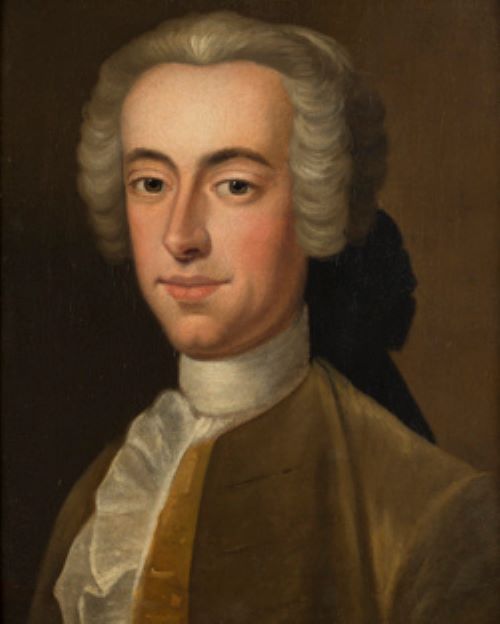On the road to the American Revolution, Thomas Hutchinson stands out as a controversial figure. He became the subject of scorn and derision after the passage of the Tea Act in 1773. As we prepare for the 250th anniversary of the Boston Tea Party on December 16, 1773, let’s take a look at Thomas Hutchinson and profile the man caught at the center of the political firestorm in Boston.
Early Life and Political Ascent: Born in 1711 in Boston, Thomas Hutchinson rose to prominence in colonial Massachusetts. He was a smart guy with the grades (and connections) to get into Harvard. Yes, he got into the same Harvard where Reese Witherspoon got her law degree in Legally Blonde. The same Harvard with the $50 billion+ endowment and with all the drop outs that started the world’s largest tech companies. Hutchinson did not drop out. In fact, he enrolled at age 12 and graduated at age 16. What’s up Bill Gates? Take that Mark Zuckerberg!
After graduation, Hutchinson put his big brain to work in the family business. When he was in his mid-20s, Hutchinson got the political itch and became a member of the Massachusetts colonial legislature. In 1758, his resume expanded as he became lieutenant governor of Massachusetts. This was in addition to being a member of the governor’s council and chief justice of the Superior Court. As if he wasn’t already an overachiever, Hutchinson wrote and published two volumes of Massachusetts history. When did Hutchinson sleep? This is a question that vexes historians to this day!
Governorship and Loyalty to the Crown: After the French and Indian War, the British made multiple attempts to exact revenue from the American colonists. This was first ushered in by the Stamp Act of 1765. Colonists in Massachusetts and other parts of America were furious at these acts. Their passage without direct representation in Parliament convinced the colonists that they were second-class citizens. The taxes were bad, but the principle of not being able to consent to the system of taxation was at the heart of colonial protests. These protests often turned violent.
Hutchinson was in the crossfire of the political firestorm. He never felt like a second class citizen. As Lieutenant Governor (1758) and later Governor (1771), Hutchinson’s unwavering loyalty to the British Empire was non-negotiable. He was first and foremost an Englishman.
The Boston Tea Party: Hutchinson’s house had been ransacked by a mob in 1765. In 1770, after five colonists were killed during the infamous Boston Massacre, Hutchinson attempted to restore order by arresting and holding a trial for the British soldiers involved. As he sensed the tensions were boiling into an ever widening rebellion, he tried to resign. Instead, he was promoted!
By the time he was governor in 1773, the next crisis came in the form of the Tea Act. This act stoked the ire of the colonists in Massachusetts. It was an act that favored the British East India Company at the expense of a very profitable tea smuggling business that had benefited colonial merchants. In fact, the Tea Act seemed to favor Hutchinson’s family and warranted accusations of cronyism.
As we prepare to recognize the 250th anniversary of the Boston Tea Party on December 16, 2023, it is important to note that November 1773 was also a turbulent time for Hutchinson as a result of several private letters that were made public. Ben Franklin leaked several letters that Hutchinson had written which appeared to corroborate the accusation that Hutchinson wanted to curtail the rights of the colonists.
Thus, by the night of December 16, 1773, Hutchinson was already in the middle of a boiling pot of political scandals. The Boston Tea Party did not help him. In fact, it turned out to be the death knell for his career as governor of Massachusetts. Shortly after the incident in Boston Harbor, Hutchinson was replaced by General Thomas Gage. This indicated that the British were ready to push back with force. General Gage was a veteran of the French and Indian War, and someone that could push back against the political protests with some more muscle.
Exile and Enduring Legacy: Ultimately, Hutchinson was exiled to Britain. He lost his property and left his home in Massachusetts. Despite his promising life and successful career, he found himself on the wrong side of the sweeping political tide. One must admire his principled stand for what he believed in and his loyalty was undoubtedly a virtue.
Hutchinson’s failure was to recognize that his fellow colonists were being treated as second class citizens. American colonists had a right to be governed based on their consent. We still have a natural right to government by consent. We are not to be ruled over and granted rights by a monarch. As Americans, we have rights intrinsic to ourselves, which are not granted by an arbitrary power. This is what makes America special and unique. This is what Hutchinson’s fellow colonists were fighting to establish. If Hutchinson had been successful, we would not be preparing to celebrate our 250th birthday.

